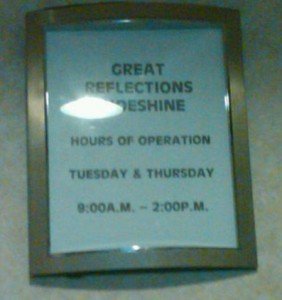 Last weekend my wife and I were at a conference in Cleveland. As I walked through the hotel, I noticed a pair of shoe shine chairs – with no one to do any shining.
Last weekend my wife and I were at a conference in Cleveland. As I walked through the hotel, I noticed a pair of shoe shine chairs – with no one to do any shining.
Later in the day I noticed the chairs still unmanned.
Then I looked up and saw the sign above the chairs.
Since it was Friday, I was out of luck – no shine now until Tuesday!
While I realize that those running these chairs can’t be there all the time, and I’m not trying to tell them how to run their business, it got me thinking about a common leadership challenge.
The story of the leader with “an open door policy” who is never available, accessible or who never has their door open would be comical, if it weren’t so sad.
In fact, I’ve never met a leader who didn’t say their door is open and that they wanted to talk to people. But I’ve met hundreds of staff members – at all organizational levels – who didn’t feel their leader was accessible to them at all (or nearly enough).
Leaders are busy people – I get that. But before you start backtracking and justifying your availability, let me say a couple things:
- You can’t lead in a vacuum.
- People won’t follow an absentee leader for long.
- Saying your door is open is very different from being available.
I am not saying that you should be available to your team or staff at any and all times. Reasonable people recgnize that you have leadership responsbilities and are busy.
Good time managment requires that you segment your time; in fact I would recommend you schedule time to do your work uninterrupted. doing so will make you more productive and better able to handle the requests and challenges of your team when you do speak with them.
What people want is access to you and your focused attention when they are with you.
If you aren’t giving those things to people, you aren’t leading nearly as effectively as you could be.
Rather than preaching any more, let me give you your leadership activity of the day – two questions to help you think about this topic and how you can apply it to your work.
Am I available enough, by the standards of those I lead?
Am I present with people when I am talking with them?
If you don’t know that answers to these questions, ask others and get some feedback. Then take action on that feedback – whether to keep doing what you are doing, or to make some adjustments.

Some great stuff, Kevin!!!
Thank you for this reminding. Availability is a result of action. Great !!!
As I always tell the students whom I work with and oversee: “My door is always open unless it’s closed.”
Terrific post, Kevin. So, what’s the solution for the shoeshine stand at the hotel. What should they do?
I grin whenever I hear open door policy because I used this to my advantage as a lowly private in the Army. You can read the story here http://bit.ly/9PCBdd.
In short, I used it to effectively cut through red tape, bullying and the corporate attitudes that exist in the military. However, it didn’t work with a different leader later because as you pointed out, that leader didn’t want to be bothered.